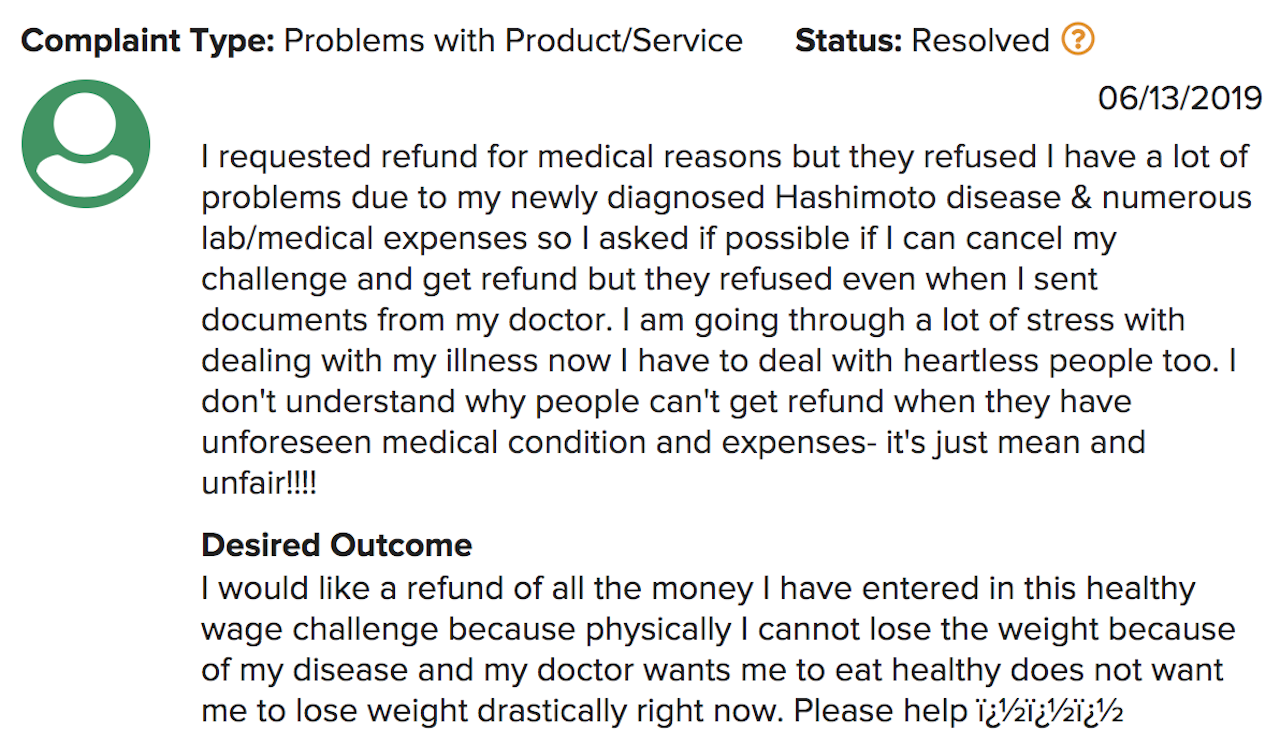If you’ve ever so much as thought about wanting to lose weight within three feet of a smart device, you’ve probably found yourself the target of ads from apps that claim to help whenever you scroll through Facebook. MyFitnessPal, Fitbit, Noom, and Lose It! tend to dominate the conversation when it comes to weight loss, but lately, there’s been a new trend in app stores everywhere. Known as the “weight wagering movement,” the companies behind apps like DietBet and HealthyWage offer up an additional enticement: lose weight and get paid to do it. With all the vigor of a multi-level marketing scheme, these ads say things like “win up to $10,000 in a weight loss challenge!” or “Become more active and earn money doing it!”
As always, there’s a catch. The thing they don’t tell you is that you are competing against yourself: once you sign up, you give the app your money (HealthyWage bets start at $100) and bet that you will lose a certain amount of weight in a specific timeframe — if you succeed, you get your original bet back. If you go above and beyond, you can win even more money. For example, a 5’8” 200lb person might bet $1,000 that they’ll lose 65 pounds in 10 months ($100 per month installments, or $1,000 paid up front) — the more money they put down and the more weight they vow to lose, the more they gain to win (this scenario would earn them $2,205). Losing more weight in the same time span or in even less time does not necessarily result in more money and seems to be based on a person’s initial height and weight inputs, which are verified by filming weigh-ins and sending them to one of HealthyWage’s referees for confirmation.
You can join on your own but you can also recruit friends, family, or Internet strangers to join you in online group challenges. These group challenges to win massive pots of $10,000 or more that are split evenly among winners. The logic is that the pressure added by the financial stake provides accountability for people who need that extra push, and that a support system of fellow dieters can help them get there. The problem is that these apps don’t actually help you lose weight over the long run.
When 95 percent of dieting attempts fail, “weight wagering” looks more like tricking vulnerable people into gambling away their paycheck on a losing bet.
For decades now, study after study has proven that dieting doesn’t work and that diets have a failure rate of 95 percent or more. In fact, most people who take on diets tend to gain more weight afterwards — one study that followed The Biggest Loser contestants six years after their weight loss showed that almost every single participant (save for one) had regained the weight and even stunted their metabolic rate to boot, increasing the likelihood that they would gain more weight. From influencers toting scammy detox teas and pseudoscientific stomach wraps to the tech-tinged bullshit of the Keto diet, diet culture thrives despite all evidence of its failures, to the tune of a $70 billion dollar industry.
Losing weight remains among the most common New Year’s resolutions, but it’s a game no one can win: companies can sell a 730 calorie sandwich because it’s the only food that’s cheap enough for many workers to afford on a minimum wage paycheck. Those same companies can then turn around and tell them that the sandwich has made them fat and that they should lose the weight they gained from eating it. In truth, a person’s weight has more to do with their genetics, medication, hormonal fluctuations, stress, income, and sleep quality than what they eat.
So of course the atmosphere is ripe for companies like HealthyWage and WayBetter Inc. (creators of DietBet, StepBet, and RunBet) to yoke people’s anxieties about their bodies to a hope of financial windfall. But when 95 percent of dieting attempts fail, “weight wagering” looks more like tricking vulnerable people into gambling away their paycheck on a losing bet.
One of the most controversial aspects of apps like HealthyWage is that they have a strict no refund policy. “Part of our job is to prevent you from giving up, so you can't quit,” the company claims on its FAQ section. Scrolling through their online reviews, it’s clear why this is an unfair system. One user writes in a Better Business Bureau complaint that HealthyWage wouldn’t give them a refund even after they were diagnosed with Hashimoto’s thyroiditis, an auto-immune disease that causes hormonal fluctuations and weight gain. Others report having to quit their bets after realizing they were engaging in unhealthy behavior to try to meet their goals. Almost every plea receives the same reply from HealthyWage, reminding them that the no refund policy is clearly stated. And of course HealthyWage can’t offer refunds: People who lose the challenges are the ones who keep the lights on.
And when you break down the numbers, it’s clear that even the winners don’t win much at all. Let’s say you’re one of the few people who meets your goal. You bet $5,000 that you’ll lose 65 pounds in six months. At the end of the timeframe, you lose exactly 65 pounds. According to HealthyWage’s website, the earnings are taxed as 1099 income on the state and federal level because they are technically contest winnings – that means 25 percent of the total must be paid towards federal taxes (if the prize is more than $5,000), leaving you with $3,750 before you even have to deduct state taxes and administrative fees. And the administrative fees are no joke — one HealthyWage challenge listed the fee as 25 percent of the wagered amount. And of course this doesn’t account for any money you might have spent on expensive gym memberships or fitness classes.
If you don’t bet a high amount, the entire system isn’t even worth the hassle. One user in a weight-wagering support group on Facebook mentioned joining a challenge called Thinner Thinner Winner Winner in which she bet $100 to lose six percent of her total body weight in 12 weeks to earn her share of a $30,600 pot. 405 people took the same bet, and 223 (a little more than half) completed the challenge. That means the payout came out to roughly $136 per person. Amortized over 12 weeks, that’s a little more than $11 per week – you’d earn more working as a sandwich artist at Subway.
Fatness depends heavily on genetic factors like body-fat distribution and metabolism and environmental issues like a lack of access to healthy food, but the weight loss industry continues to reiterate the pernicious lie that fat people are just overweight because they lack motivation or discipline (it’s why measures like the Body Mass Index continue to be a measure of health despite the fact that someone like Dwayne “The Rock” Johnson would technically qualify as obese by its standards). These biases manifest in the medical industry, where healthy “overweight” patients still receive worse quality of care. It’s this type of reckless misconception that allows a pseudoscientific movement like weight wagering to thrive — and why the house will always win.



